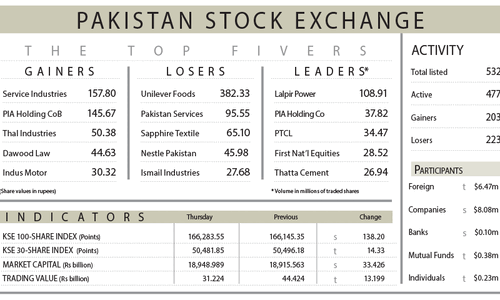ISLAMABAD: Prime Minister Shehbaz Sharif announced a per-litre reduction of Rs18 to 40 in fuel prices on Thursday with immediate effect for the next fortnight, i.e. until July 31.
In his address to the nation on Thursday, the prime minister said that as promised he was passing on to the people each paisa of price reduction in the international markets and announced a Rs18.50 per litre cut in the price of petrol and Rs40.54 per litre in that of high-speed diesel (HSD).
Separately, the finance ministry in a statement also announced a per-litre cut of Rs33.81 and Rs34.71 in kerosene and light diesel oil (LDO) prices, respectively.
The government did not change the rate of petroleum development levy (PDL) that stood at Rs10 per litre on petrol and Rs5 each on the other three products.
Under the decision, the ex-depot price of petrol has now been lowered to Rs230.24 per litre from Rs248.74, down by Rs18.50 (or 7.4pc).
The new rates of HSD, kerosene and LDO now stood at Rs236, Rs196.45 and Rs191.44, respectively.
Under a deal with the International Monetary Fund (IMF), the government has to gradually increase PDL on petroleum products to a maximum of Rs50 per litre to collect Rs855bn during the current fiscal year. This is the first time the PML-N-led coalition government is reducing petroleum prices after it came to power about three months ago.
Between May 26 and July 1, the petrol price skyrocketed by 66pc (or Rs99 per litre) and the HSD price went up by 92pc (132.39). Likewise, kerosene jumped by 95pc (Rs111.95) and LDO by 80pc (Rs100.59) per litre during the period.
In his address, the prime minister said the coalition government came to power when inflation was at its peak and global oil prices were sky-high, but the previous government disregarded the agreement with the IMF it had itself signed.
While bowing out, the PTI government laid landmines for the upcoming government to trap it before it could settle down and suddenly announced fuel subsidies for which there was no money in the kitty, he said.
On the other hand, the PTI government did not take the benefit of lowest-ever gas prices in the international market when the commodity could have been secured through long-term contracts at about $5 per unit, the premier said, adding that the price for this criminal negligence was being paid by the nation at present in the shape of high energy prices.
Mr Sharif said he had promised the nation that he would never mislead them, and with a heavy heart decided to increase oil prices because of the international market. This obviously burdened the common people but there was no other option except to take tough decisions, he said.
The prime minister said that global oil prices were now declining swiftly and he had been blessed to pass on its relief to the people. He also promised to pass on future price reductions to citizens.
Referring to an IMF agreement for reviving its programme, the prime minister said many modern economies had graduated from Fund programmes 25 to 30 years ago with sheer hard work and commitment and were now among the great nations.
He said the government would earnestly implement the IMF programme and would like this to be the last programme because self-reliance was the only path for nations to stand on their feet and earn respect among the comity of nations.
“But this is not an easy path,” he said, adding that this would require a lot of hard work, commitment and trust in Almighty Allah. The prime minister said the coalition government, PML-N supremo Nawaz Sharif and all other leaders of the coalition partners would take Pakistan to new heights of development and stability with unity, commitment, equanimity and sincere efforts.
The prime minister said Pakistan would have to learn lessons from past mistakes like those in the shape of Neelum-Jhelum project which was completed at a cost of $5bn because of over 20 years of delays instead of its completion envisaged in $1bn.
Similar was the case with a 1,250-megawatt, LNG-based power project launched by Nawaz Sharif which should have been completed two years ago but was still not operational.
The one option is to waste public money and time and the other path is to work diligently and keep moving up the ladder. He said the government would now focus over the next 14 months on three key sectors — agriculture, information technology and exports — and come up with detailed policies for quantum jump in these areas within the next couple of weeks.
Published in Dawn, July 15th, 2022



































